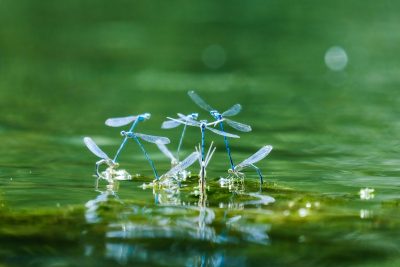River biodiversity study wins nature prize

Aquatic ecologist Professor Peter Haase has been honoured with the Frontiers Planet Prize for his groundbreaking work on river biodiversity.
With a prize of just over €1 million, the award from the Frontiers Research Foundation in Switzerland is one of the world’s biggest for pioneering nature research. It recognises a study by Haase and his team on the biodiversity of rivers and streams throughout Europe.
The researchers’ analyses revealed that on average, the diversity of species and ecological functions in rivers has increased over the last 50 years, but that this positive trend has come to a halt since 2010. Based on these results, measures for the recovery of freshwater biodiversity can be identified to improve the important functions of river ecosystems.
Through intensive land use due to development and agriculture, river regulation, invasive animal and plant species, global climate change, and pollution, humans have a tremendous impact on river ecosystems.
“Our analyses revealed that, on average, the diversity of species and ecological functions in rivers has increased over the last 50 years, beginning at a very low level as a result of the intense pressures in the past."
“In order to track the development of biotic communities in rivers, an international team headed by me has compiled and evaluated time series on the biodiversity of streams and rivers throughout Europe,” explains Haase from the Senckenberg Research Institute, Natural History Museum Frankfurt and the University of Duisburg-Essen.
“Our analyses revealed that, on average, the diversity of species and ecological functions in rivers has increased over the last 50 years, beginning at a very low level as a result of the intense pressures in the past. However, this positive trend has levelled off since 2010.”

Studying invertebrates such as bivalves, crayfish, or mayflies from 1,816 sites on rivers in 22 European countries, the team was able to demonstrate improvements through measures such as the construction of wastewater treatment plants. At the same time, new and ongoing pressures on our streams and rivers have halted the positive trend since 2010.
The scientists outline additional measures to advance the recovery of freshwater biodiversity and improve the important functions of river ecosystems.
Professor Klement Tockner, director general of the Senckenberg Institute for Natural Research said, “Our streams and rivers are among the most valuable habitats – for nature and for humans. At the same time, they are under greater threat than ever before.
"That is why the EU Nature Restoration Law is essential in order to pass on to future generations a natural environment worth living in. The work of Senckenberg researchers contributes important building blocks of knowledge in this regard.”
The Frontiers Research Foundation is a non-profit based in Switzerland that supports programmes that advance scientific solutions for a healthy life on a healthy planet. The Frontiers Planet Prize recognises scientific breakthroughs that contribute to the stabilisation of the planet’s ecosystem.
Each member of a jury of 100 experts, led by Professor Johan Rockström from the Potsdam Institute for Climate Impact Research, initially selects one National Champion from among the nominees. Three International Champions are then chosen from their ranks and honoured in a ceremony.
The institutions of the three recognised individuals receive one million Swiss francs each to support the research of prizewinners, and publicise their findings on a global scale.
